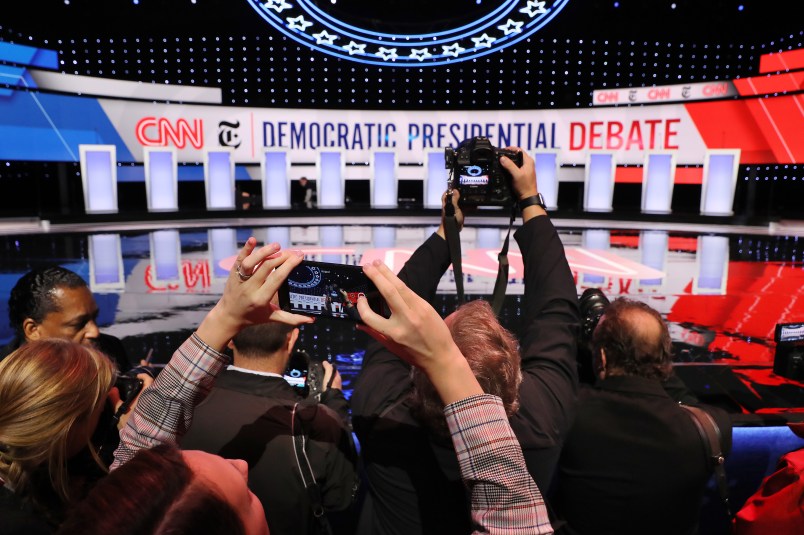Tuesday’s Democratic debate, the first since the Ukraine scandal exploded and the impeachment inquiry got underway, will feature a sprawling field of 12 presidential hopefuls.
The debate will be hosted by the New York Times and CNN at Otterbein University in Ohio starting at 8 p.m. ET. Here are the biggest dynamics undergirding Tuesday’s event:
Warren’s surge
Sen. Elizabeth Warren’s (D-MA) surge in the polls has brought her even to, and sometimes surpassing, former Vice President Joe Biden. Tuesday will be the first time that Biden is not the only clear frontrunner in the pack.
Warren hasn’t come under too much fire so far, and has proved adept at dispensing with the bizarre attacks launched against her from various far-right sources — such as her “affair” with a young Marine or “lies” about pregnancy discrimination.
We’ll be watching to see how she handles the other candidates’ fire in real time.
Biden’s impeachment response
So far, Biden has seemed to struggle in forming a cogent response to Trump trying to pressure the Ukrainian government to fabricate claims of corruption against the former vice president and his son, Hunter. Trump’s scheme has formed the basis of Democrats’ impeachment inquiry.
Biden has shifted his tone on impeachment, at least, last week going from senatorial caution to full-fledged support.
Biden also dispatched Hunter to sit for an interview with ABC News Tuesday morning, during which the younger Biden called taking the position on a Ukrainian company’s board a “mistake” but not an “ethical lapse.”
Sanders’ heart procedure
Sen. Bernie Sanders (I-VT) was hospitalized for a heart procedure earlier this month after experiencing a blockage in one artery. His campaign eventually admitted that the senator suffered a heart attack.
Sanders said he’d have to “change the nature” of his campaign after the episode, to make sure he’d have the “strength” to continue his run.
At age 78, Sanders is now going to have to fend off the implication that this injury is a sign of his frailty and inability to handle such a stressful job.
November debate’s higher threshold
The next debate, set for November, again raises the threshold after September’s and October’s held steady at 130,000 unique donors and 2 percent in four qualifying polls. To make the stage in November, candidates will need donations from 165,000 donors and to meet a new polling requirement: either 3 percent in four qualifying polls, or 5 percent in two qualifying polls from Iowa, New Hampshire, South Carolina or Nevada.
October debaters former Rep. Beto O’Rourke (D-TX), Sen. Amy Klobuchar (D-MN), former HUD Secretary Julian Castro and Rep. Tulsi Gabbard (D-HI) haven’t yet qualified for the next stage. The pressure is on for those four to have a breakout moment and re-engage some enthusiasm to appear at the next debate.
For a smattering of others — such as Sen. Michael Bennett (D-CO) or former Rep. John Delaney (D-MD) — it’s hard to see a path to the next debate if even the September/October requirements were insurmountable.
Size of the pack
Finally, the sheer size of Tuesday’s debate crowd will likely prove a hindrance to those trying to break out of the pack. With the debut of billionaire Tom Steyer, the group swells to 12 people, the largest group to debate on one night so far.







With 12 on the stage there will be nothing meaningful to watch for.
NPR’s in panic mode: Who’s going to stop Liz or Bernie? They suggest Pete B. Um, no.
I suppose it’s still early enough to, if not justify, at least excuse this many candidates on the stage at one time even though I have absolutely no idea what business Steyer and Gabbard have up there.
Frankly don’t think anyone is going to accomplish much in a crowd like that but I suppose we might hear something interesting from someone, maybe.
Maybe a candidate will predict betrayal by one of those on stage, and foretell that – before the cock crows – Peter Buttigieg will thrice deny knowing them?
We already know who is playing the Judas role…